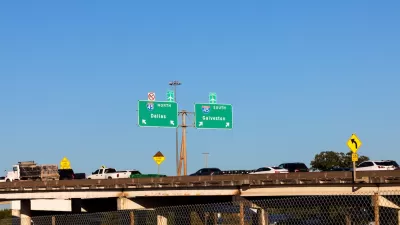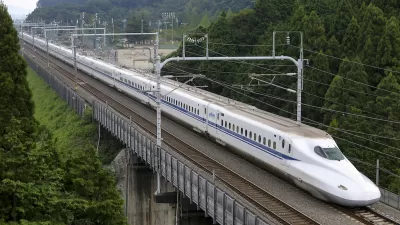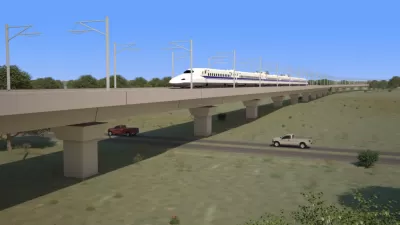The Houston to Dallas high speed rail train will be built with the cooperation of Japan's Central Railway, a longtime successful and profitable operator of Shinkansen bullet train lines. Securing the private financing is key to the project.
"Today, there are only three significant high-speed rail projects in advanced development in the U.S. — in Texas, Florida and California," write Aman Batheja and Stephen J. Smith of The Texas Tribune, though All Aboard Florida's maximum speed is 125 mph.
Japan's Central Japan Railway (or J.R. Central), which operates several Shinkansen lines and is described by Wikipedia as "Japan's most profitable and highest throughput high-speed-rail operator," "sees a huge opportunity for exporting its technology to America," according to Batheja and Smith.
At some point during the early planning of all three [aforementioned] ventures, J.R. Central offered to sell its trains to those states but only found sure footing in Texas. The Texas project, led by a private local company working with J.R. Central, is by far the most ambitious.
In fact, the reporters are so enthralled with Texas Central Railway, linking the 230 miles between Houston to Dallas with 205 mph Shinkansen (or Shinkansen-like) bullet trains in under 90 minutes and set to open in 2021, that they state that it "may turn out to be a transformative event in the history of the nation’s transportation system."
According to the project's website, "The system we are promoting is the N700-I Bullet based on the Tokaido Shinkansen that is currently operating in Japan with a nearly 50-year perfect safety record and an average annual delay of less than one minute.
"Texas Central officials have said the project will be privately funded and not require any public funding to subsidize its operational costs," write Batheja and Smith, adding that "Texas also has a history of embracing the private sector for infrastructure projects, particularly toll roads." And there's the rub - the track record has not exactly been stellar.
The best-known of those projects, a privately financed, 41-mile stretch of State Highway 130 in Austin that sports an 85-mph speed limit, the fastest in the country, technically defaulted on its debt in July, according to Moody’s Investors Service.
But lets end on a positive note, particularly from an urban, Texas-centric perspective, assuming that is not an oxymoron.
Batheja and Smith write, "If successful, it could mark a turning point in the urbanization of the U.S., and a high-profile rebuff to more progressive coastal cities that have struggled to modernize transit systems with the high-speed technology that has already reshaped Asia and Europe."
Authors' note: This story was produced in partnership with Next City, a nonprofit organization that covers development in metropolitan regions
Correspondent's note: Article is cross-posted in Next City and Myhighplains.com.
FULL STORY: The Bullet Train That Could Change Everything

Planetizen Federal Action Tracker
A weekly monitor of how Trump’s orders and actions are impacting planners and planning in America.

Maui's Vacation Rental Debate Turns Ugly
Verbal attacks, misinformation campaigns and fistfights plague a high-stakes debate to convert thousands of vacation rentals into long-term housing.

San Francisco Suspends Traffic Calming Amidst Record Deaths
Citing “a challenging fiscal landscape,” the city will cease the program on the heels of 42 traffic deaths, including 24 pedestrians.

Defunct Pittsburgh Power Plant to Become Residential Tower
A decommissioned steam heat plant will be redeveloped into almost 100 affordable housing units.

Trump Prompts Restructuring of Transportation Research Board in “Unprecedented Overreach”
The TRB has eliminated more than half of its committees including those focused on climate, equity, and cities.

Amtrak Rolls Out New Orleans to Alabama “Mardi Gras” Train
The new service will operate morning and evening departures between Mobile and New Orleans.
Urban Design for Planners 1: Software Tools
This six-course series explores essential urban design concepts using open source software and equips planners with the tools they need to participate fully in the urban design process.
Planning for Universal Design
Learn the tools for implementing Universal Design in planning regulations.
Heyer Gruel & Associates PA
JM Goldson LLC
Custer County Colorado
City of Camden Redevelopment Agency
City of Astoria
Transportation Research & Education Center (TREC) at Portland State University
Jefferson Parish Government
Camden Redevelopment Agency
City of Claremont





























